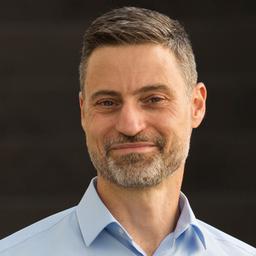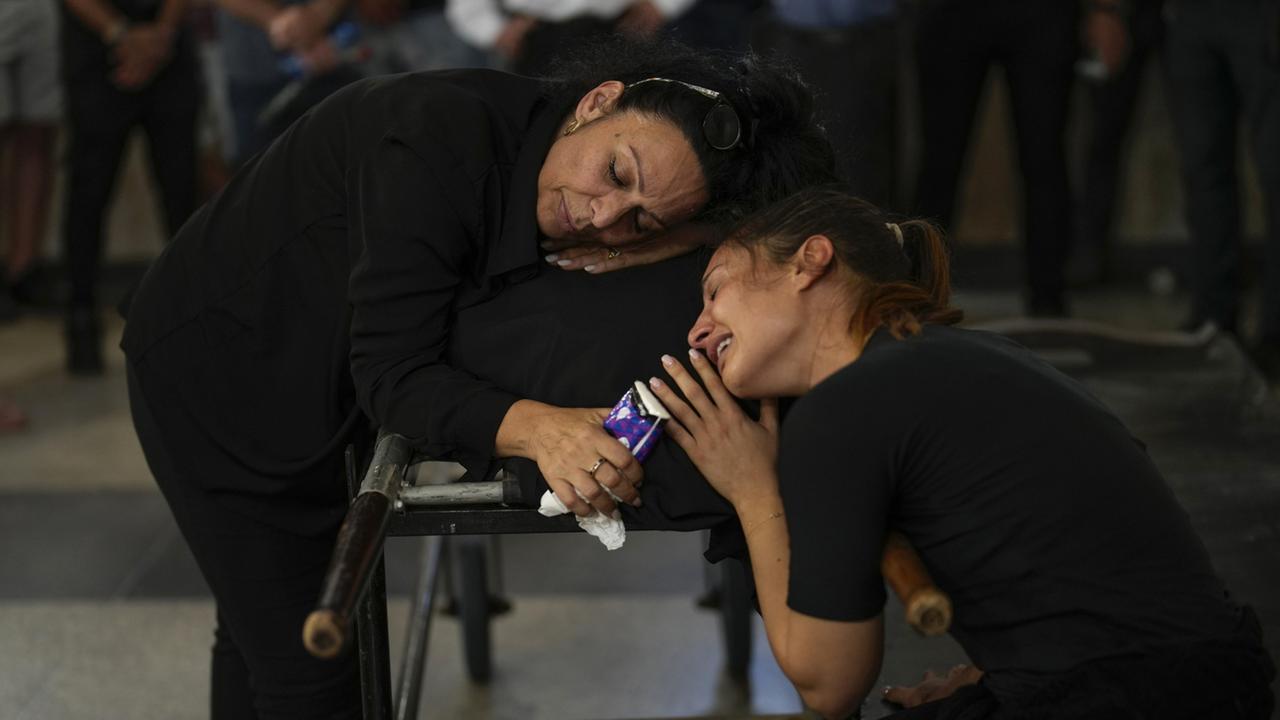interview
100 days after the attack by Hamas terrorists, historian Meron Mendel sees Israel as being in constant shock. He describes how the attack has shaken Israel's self-image – and why there is little room for empathy.
tagesschau.de: You were recently back in Israel. How do you think the events of October 7th and the subsequent war changed Israel and society?
Meron Mendel: On October 7th, the retraumatization of an entire society took place. During my recent visit, I met family and friends, almost exclusively people who have been committed to peace for many years, and who have also actively taken part in the protest against Benjamin Netanyahu since January last year. And everyone is still so shocked by the scale of the cruelty of the October 7th atrocities. Added to this is the ongoing and increasing concern for the hostages.
What happened hit precisely the people of Israel who were committed to peace and reconciliation, because Hamas attacked not the army, not the settlers, but the kibbutzim and villages on the border with Gaza, which are known for that they are part of the peace movement. Some of the icons of the peace movement, such as Vivian Silver from Kibbutz Be'eri, were brutally murdered. This has made it clear to many Israelis that Hamas wants to murder all Jews in Israel.

To person
Meron Mendel is an Israeli-German journalist and historian. He is director of the Anne Frank Educational Center and professor at the Frankfurt University of Applied Sciences. His book “Talking about Israel. A German Debate” was nominated for the German Non-Fiction Prize 2023.
“Another link in a long chain of pogroms”
tagesschau.de: Can you describe this retraumatization with an example?
Mendel: I met with my best friend's parents, with whom I spent my entire youth and for whom I am like a second son. My friend's sister was murdered with her husband on October 7th. When the terrorists attacked their house, the sister threw herself protectively over her son, who was only injured and survived. Her father told me: “My mother had to see her parents murdered in front of her eyes during the pogroms in what was then Poland. And now my grandson had to see his parents murdered before his eyes.”
So the family trauma has repeated itself before their eyes. For many people, the attacks on October 7th are another link in the long chain of persecution and pogroms. These are stories and tales that everyone in Israel knows from their own family.
tagesschau.de: As a state, Israel is a promise to all Jews in the world that there is a safe haven and that they are no longer defenseless against persecution and violence. Was that shaken by October 7th?
Mendel: That has been shaken considerably. Nobody could have imagined that terrorists – like on October 7th – would roam the kibbutzim, villages and music festivals for up to 24 hours and systematically torture, murder and rape people. This remains a lasting trauma.
“There is little room for empathy”
tagesschau.de: Israel reacted harshly. The war in Gaza has resulted in an estimated 20,000 deaths. There is increasing international criticism of the suffering of the civilian population in the Gaza Strip. How is this perceived by the Israeli population?
Mendel: The suffering of civilians, the extent of the destruction and the humanitarian catastrophe receive relatively little space in the media, most daily newspapers and in television reporting. I have the impression that most people still find it very difficult to develop empathy for the suffering of civilians on the other side, given the great suffering among their own population. Because every Israeli has lost someone from their family or acquaintances.
Everyone fears for the fate of the hostages. There is little room for empathy. I can understand that to a certain extent. But I also think it's wrong because then you entrench yourself in a very narrow view of the conflict. However, this does not promise a solution to the problem, but rather a continuation of the violence.
“You feel treated unfairly”
tagesschau.de: To what extent is it perceived that this discussion is taking place intensively outside Israel? Do you feel misunderstood at this point?
Mendel: You not only feel misunderstood, but you feel treated unfairly. The Israelis, who have many contacts abroad, whose set of values is universalistic and who belong to the peace camp, have observed very closely how similar-minded people around the world reacted to October 7th – especially the left-wing spectrum in Europe and the USA, the universities, the art and cultural world. There is bitter disappointment because they have felt cold.
After the music festival massacre, there was a resounding silence in these circles. This really hurt many people, especially in the peace camp. They feel that they no longer have allies abroad, that they have been left alone at a time when they needed the solidarity of the world.
This also includes the fact that despite the large scale of rape and sexual violence on October 7th, women's rights organizations remained silent. And that deeply hurt many women I spoke to. It gives the impression that if Jewish girls and women in Israel are raped in this way, it doesn't count for international women's organizations.
When it comes to criticism of warfare, I have encountered different attitudes in Israel. Some felt they were being treated unfairly because the world does not see that Israel is fighting for its existence and that it cannot do so without killing civilians. Others think it's good that the world is looking closely and criticizing this because they themselves distrust their own government and army leadership as to whether the war is being waged without international control according to the standards of international law of war.
Length of war “increasingly criticized”
tagesschau.de: Netanyahu is preparing the population for a long war. Is this also supported by the majority?
Mendel: This is increasingly being criticized and is particularly controversial when it comes to the question: What is most likely to lead to the hostages being freed? Netanyahu's government argues that only military pressure will force Hamas to negotiate over the hostages and ultimately release them in an exchange.
Netanyahu's critics point out that the conduct of the war so far, from the hostage exchange in November to today, has not led to any further freeing of hostages. They are calling for a ceasefire in order to create the conditions for the hostages to be released.
“Netanyahu is playing for time”
tagesschau.de: Terror attacks and war have hit a society that was already in the midst of a profound debate about its self-image, triggered by the Netanyahu government's judicial reform. Did you still feel this crack when you visited or is it covered over?
Mendel: It wasn't just a crack, it was a fracture, and it's still there, but no longer on the surface. It has gradually faded into the background, but is slowly becoming more visible again and, I suspect, will become stronger and stronger in the next few months – as long as the war continues, as long as Netanyahu's goal is to prolong the war to such an extent that it… can hold on to his office as Prime Minister.
Many Israelis who were in the camp of Netanyahu and his allies before October 7th switched to the other camp after October 7th. The government's poll numbers are currently not very positive for Netanyahu and it is clear that he is therefore playing for time.
But his opponents are in a dilemma. Demanding that a prime minister step down during a war and perhaps organizing large demonstrations like before October 7th is a delicate matter. This is exactly what Netanyahu is aiming for with his tactics.
“It’s also about narratives”
tagesschau.de: Immediately after the terrorist attack, there was strong criticism of the security services. Has this debate also been postponed?
Mendel: This debate still exists, and it is also about narratives. Who is to blame – the military or politicians? Netanyahu's camp also speaks of failure, but sees overall responsibility with the army and the intelligence services. He does not admit his own responsibility.
The army has now convened a committee of inquiry into the military failings – which in turn has been sharply criticized by the government. So the question of who is investigating what is also highly explosive. There are also conspiracy theories among Netanyahu's supporters that the army deliberately allowed the events of October 7th to overthrow Netanyahu.
“A war without a political goal is not legitimate”
tagesschau.de: The question remains what happens afterwards. What answers do you hear?
Mendel: One thing is clear: neither Hamas nor Netanyahu are interested in a long-term political solution. Hamas's “business model” is that after the conflict all investments go to re-armament and the construction of tunnels. In this respect, Netanyahu is the perfect partner for them. Because his strategy is that the division of the Palestinians between the Fatah movement in the West Bank and Hamas in the Gaza Strip continues.
There is no talk of long-term political solutions on either the Palestinian or Israeli sides. There has not been a single meeting of the Israeli Cabinet at which, apart from empty phrases, there has been any discussion of what the political aim of the war is. What will happen in the Gaza Strip afterwards? It is therefore the task of the international community to tell the Israelis clearly: a war without a political goal, without a vision, is not a legitimate war.
We hear from the right-wing extremist side of the Israeli cabinet the demand that the Palestinians be expelled from Gaza, that out of 1.3 million Palestinians only 100,000 to 200,000 should remain. One can only be horrified by this vision.
In my opinion there is only one viable solution. And that is a joint government of the West Bank and Gaza under the leadership of the Palestinian Authority, and that can only happen under two conditions. The Palestinian Authority is committed to taking responsibility for Gaza and in return will receive support from Israel and the international community. And, very importantly, recognition as a Palestinian state.
The Palestinians have long expressed their desire to establish a Palestinian state. And it is time for them to be able to implement this wish at least on a symbolic level through recognition by the United Nations and the global community.
“Recognition of one Palestinian state would be the right step”
…




